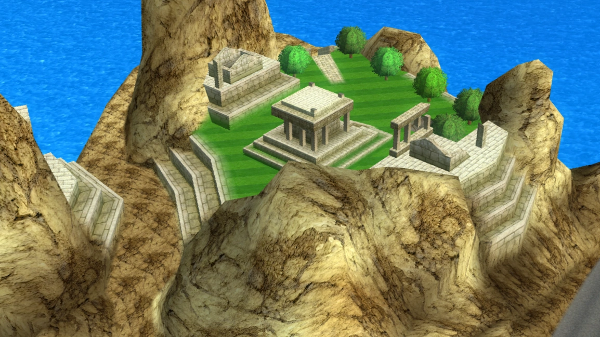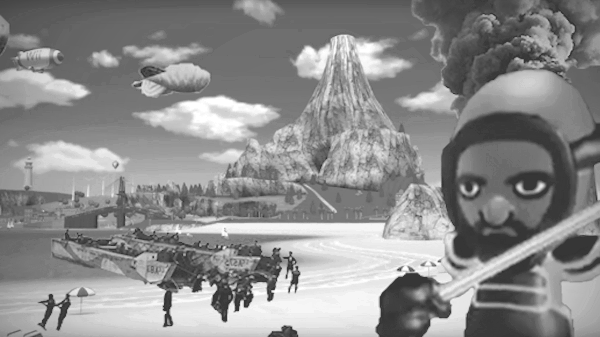The History of Wuhu Island
Civilisation on Wuhu Island is believed to have started during the stone age. Little is known about the earliest beings on the island. It is thought that they were a less developed civilisation, yet they left traces of their culture and lifestyle in the remains of their city. Looking at the sharp contrast between the ruins on the north side of the island, which appear to have been built by a highly advanced civilization, and the huge, crude, half-destroyed monoliths on the southern side, it could be assumed that there was a battle over the island at some time.

The more advanced civilization, which built the "The Mysterious Ruins" on the other side of the island, were incredibly advanced stonemasons. A few coins and pots were found in the ruins as well as some interesting spear-like weapons that may have been used in the battle against the other civilization. Also, scriptures on the wall show that the advanced civilization used to play a sport called Zulu which involved a ball but nothing else about the ancient sport was found.
The nearby Wedge Island also features notably unique structures and architecture. It is clear that the island was also inhabited by skilled iron smelters as evidenced by their large structures, the Red Iron Bridge and the Candle.
There is a volcano in the center called Maka Wuhu, also known as the Heart of the island. This volcano is active, but it hasn't erupted in 213 years. In ancient Wuhu Island mythology, Maka Wuhu is thought to be the living embodiment of the creator god Maka. The volcano was revered by the ancient peoples of Wuhu Island.

Wuhu Island played an important role in the events of the Second Great War, influencing the relations and conflicts between the Empire of Japan and the United States of America. The Japanese invaded the island during the Pacific Campaign of the late 30s, with the conflict being noted by many historians as one of the deadliest events to ever occur within the Pacific Theatre during the Japanese Empire's Expansion Campaign. The Miis were ruled by Imperial Japan throughout the majority of the war until their self declared liberation by Allied Forces in 1944.


Wuhu was declared an independent state in 1947 following the Potsdam Conference after the Allied Forces established that the existing Tourist Industry and natural exports could support the Wuhu Economy. The United States of America signed a treaty in 1952 establishing an agreement to defend Wuhu Island in the event of an attack, however the Americans had shown to be lenient in regards to this treaty in later years as they directed interests towards national security during the Cold War, and had taken little action against the Mushroom Kingdom during their sudden economic and military expansion during the 1970s, which was seen by many Miis as a direct threat to the people of Wuhu. Many Miis on Wuhu see the lack of authority shown by the Americans as a betrayal of the Wuhuian People, and a negative stigma was extended in regards to the West.

The Late 20th Centry and transition into the new millenium saw a sudden rise in sporting culture on Wuhu Island. Many businesses started to arise in what was called the Pacific Sporting Boom, investing in sporting goods from Asia. The new cultural era spawned an island-wide movement to improve physical and mental wellbeing. The Wuhu economy grew rapidly and saw increased tourism from around the world.
In 2009 the Wuhu Island Motorway Regulation set out controversial laws restricting the use of petrol vehicles on Wuhu roads. Transport Minister Lori Lee claimed that the new regulations paved the way for massive improvements to the environment on Wuhu. The laws were reversed in 2016 however, and many petrol vehicles began reappearing on Wuhu Island, with Miis shunning the use of electric vehicles.

In 2020, the state of Almondria declared independence, and began increasing its military capacity. After failed negotiations between the state of Wuhu and the New Almondrian Government regarding pacific ocean territory, which worsened over time after unnecessary involvement by the USA, who failed to follow their treaty accordingly, Almondria swiftly annexed the entire island. While first met with anger and retaliation by the Miis, President Fred Jones promised prosperity and economic growth for the Wuhu Miis, and the violent use of policing and military force by the Almondrians was enough to keep Miis compliant and in order. Eventually the people of Wuhu felt comfortable and protected under the leadership of Almondria. The new Wuhu Autonomous Zone was declared, with Matt Mii being declared the leader of the WAZ.
In recent years, the people of Wuhu have faced rampant military aggression by the neighbouring Mushroom Kingdom. Wuhu remains a close ally to many of our surrounding Islands, most notably with the citizens of Isle Delfino and previously with the LEGO City State. Wuhu continues to increase in strength under the leadership of Almondria, and will continue to do so for years to come!
